
“ And in many ways, all of my characters are defined by their attitude to death and the possibility of death.”- J.K. Rowling
Hallowtide, the three days of All Hallow’s Eve, All Saints Day (or Hallowmas), and All Souls Day, is an ancient part of the Christian Year. Before becoming Catholic I thought of Halloween as morbid and I couldn’t understand how to celebrate All Souls, or the Day of the Dead. What I didn’t understand is that because of Christian faith we can confront death, celebrate the saints, and remember our beloved dead during Hallowmas in light of the Resurrection. We can enter into this important three days with great hope.
And, for me, one of the most helpful guides to understanding what Catholics believe about death and the communion of saints was J.K. Rowling’s Harry Potter.
The Harry Potter series is children’s literature, but it delves into a theme that we don’t often discuss with children: death. Loss emerges in the very first chapter of the series when we discover that the infant Harry’s parents have been murdered. As we watch Harry grow up and wrestle with this sorrow and lose others that he loves during the series, it should come as no surprise that Rowling wrote the books while processing the death of her own mother.
Since becoming a parent, I’ve thought a lot about our culture’s avoidance of death and I don’t think it’s helping our children. I think that the hesitation to take children to funerals and the tendency to shield them from discussion of death may be hindering them from learning to process death when it inevitably touches their lives and as they need to face their own mortality.
But how do we introduce this difficult topic? In story we have a safe space to encounter the experiences of the characters within. In the Harry Potter series in particular we can walk through the process of Harry’s grief with him and the tale can help shape our imagination when it comes to facing death.
But it’s not just because death is a theme in the series, but because it presents a very Christian view of death that makes it so valuable. Harry Potter reveals that death is not to be feared. It is not the end of a soul’s existence. We do not slip into nothingness, but live on. We don’t have to be afraid.
In a recent podcast Christy and I did with Nancy C. Brown about reading Harry Potter with children, she reminded me that the headmaster of Harry’s school, Albus Dumbledore tells Harry in the very first book, “To the well-organized mind, death is but the next great adventure.”
And yet, we encounter characters in the series who do not face death with the courage that Dumbledore proclaims. The evil wizard Voldemort has a terror of death and a desire to avoid it at all costs. His life’s goal is to become immortal.
In the first book Voldemort attempts to steal the “sorceror’s stone” which would keep him alive indefinitely. Later in the series we discover that he has also committed horrifying crimes in order to split his own soul and house it separately from his body so that he cannot be killed. This terrible and perverse act of dark magic damages the soul almost irreparably–true repentance is the only cure. And yet Voldemort’s fear of death overshadows any concern for the good of his own soul.
In Harry Potter we learn that damaging our souls through cruelty or vice should be our fear, not the end of this life, a truth Dumbledore tries to explain to Voldemort to no avail.
“There is nothing worse than death, Dumbledore!” snarled Voldemort.
“You are quite wrong,” said Dumbledore…“Indeed, your failure to understand that there are things much worse than death has always been your greatest weakness.”
And Voldemort’s followers share his obsession with escaping death. They call themselves the Death Eaters referencing their desire to avoid the inevitable.
When Harry visits his parents’ grave in the final book he is upset by a quote that appears on their gravestone: “The last enemy to be destroyed is death” (1 Corinthians 15:26). At first glance Harry takes the quote to be in the same strain as Voldemort and the Death Eaters twisted goal of escaping death. But his friend Hermoine explains that the verse on his parents’ grave is quite different. It’s not about escaping death at all, but by living on after death.
Death is conquered not by twisting the natural order of things through evil means, but rather by living self-sacrificially with hope in the Resurrection–something Harry’s parents exemplified when they died in order to protect their son.
What Voldemort and his followers cannot grasp is that death can be conquered, but not by rending souls to manipulate extended life. They do not understand what Harry’s parents knew: love is more powerful than death. And as Christians because of the self-sacrificial love of Christ we can anchor our hope in the Resurrection.
Dumbledore and The Order of the Phoenix (wizards like Harry’s parents who fight dark magic) are a foil for Voldemort’s despicable Death Eaters. As John Granger points out in his book, How Harry Cast His Spell, the opposite of Death Eaters would be Life Eaters–a phrase that immediately conjures the idea of the Eucharist in which Christ, the Way, the Truth, and the Life offers himself as food and drink to the faithful. And the Phoenix in their title is a Christological symbol: a bird that resurrects after death.
So while Voldemort and his Death Eaters try to elude death by unnatural, vicious means, the Harry Potter series reveals that by living virtuously and courageously and sacrificing out of great love we can confront death unafraid knowing it is not the end, but the beginning of the next adventure.
But how are we to think of those we’ve lost? Are we completely cut off from the dead? Catholicism and HP don’t think so. One of the strangest Catholic teachings for this former southern Protestant to accept was the communion of saints and the idea that the saints in heaven can intercede on our behalf. In fact, Harry Potter was instrumental in giving me a sense of what the communion of saints could mean.
In Harry Potter and the Deathly Hallows when Harry is walking to meet Voldemort during the Battle of Hogwarts in full knowledge that he will be laying down his own life for those he loves, he is given courage not only by Ron and Hermoine, his best friends, but by the dead. Using a magical object called the Resurrection Stone he is able to see and talk to his mother, father, godfather, and other deceased friends who love him.
Proud of his selflessness and bravery, Harry’s dead loved ones encourage him and comfort him that they will be helping him and will be present with him even when he cannot see them. They will support him as he walks to his death. His parents, friends, and godfather have not ceased to exist although they have passed on from this life. They continue loving. Their love for Harry can surpass even death and they are ever ready to help him and spur him on toward virtue.
Doesn’t that sound like the saints? We are bound to them by the love of Christ and that love cannot be diminished even after death. They are ready to bring our prayers before Our Lord and intercede on our behalf. And celebrating them is not dismal but hopeful!
Hallowtide doesn’t have to feel creepy or morbid because if we view it through a Christian lens it really is full of hope. On All Saints Day, we honor all the saints in Heaven. And there’s a lot of saints! What a party! And on All Souls Day we remember our dead and pray for their souls. Because death isn’t the end. It isn’t to be feared or escaped. It will be conquered by love–the self-sacrificial power of our Resurrected Lord. We can call on the saints to pray for us and lead us to virtue and love until–God-willing–we join them.
So this Hallowtide let’s face our mortality with courage. Let’s celebrate the glorious saints who have gone before us. And let’s pray for the souls in Purgatory remembering the grace and hope we share in the light of the all-surpassing love of Christ.
“Do not pity the dead, Harry. Pity the living, and, above all those who live without love.” -Albus Dumbledore
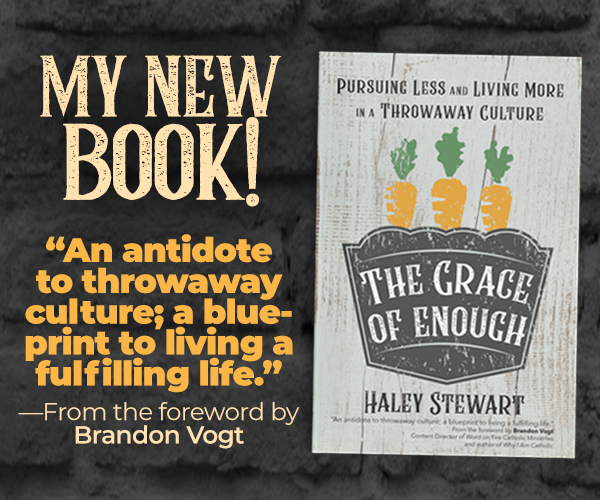
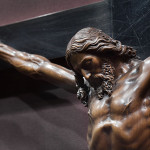
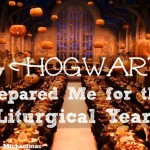
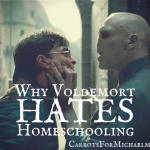
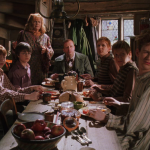
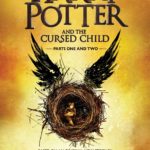

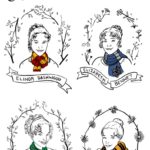
The Harry Potter series and “My Little Pony: Friendship Is Magic” are my two favourite bits of Christian-philosophy popular culture from the past 20 years. 🙂
Ha!
Haley, speaking as a fellow Catholic Harry Potter nerd, this is beautiful. I love it. Would you mind terribly if I shared this with my middle school religion students?
I’d be honored, Cecilia!
So my 8-year old has burned through the first 4 HP books but I’m hesitant to let her continue. She’s a sharp kid but I’m concerned these themes will wash over her. Plus there’s all the teenager angsty stuff coming up. I love your posts about HP and I’d love to know what you think about when to let kids read the later books.
Such a great question! Our oldest will be 7 in a couple of months and we just let him read the first book. We’re planning to listen to the second as an audiobook on our drive to FL for the holidays then we’ll take another break for a few months. Hopefully spacing book three out to when he’s close to 8 and then book 4 when he’s close to 9. That’s the plan but…..who knows how it will work exactly 😉 My concern with him since he’s NOT a sensitive kid when it comes to suspense is that, as you said, he won’t really grasp the themes in the later books. Nancy C. Brown talks a little bit about how to gauge when your child is ready to read what book in The Mystery of Harry Potter which is a GREAT read. I think trust your gut? If you feel she’s not ready yet then take a break until you think she is. 🙂
Just jumping in to agree that there’s no perfect/universal age for reading HP, and it’s very individual. I just finished reading Deathly Hallows with my youngest, who is 13. Until this past summer, we had only read the first four together (read-alouds). My older girls and I were quite proud of ourselves for keeping most MAJOR spoilers a secret for so many years! 🙂
Anyway, at 13, she was totally ready for the beauty of Deathly Hallows. As I sniffled and choked my way through reading “The Forest Again” aloud, Ramona was sobbing. “It’s so Christian!” she said.
It was a beautiful moment.
Heather Williams is my godmother my mom said you guys know each other. And I like what you said about HP and I love the books!
I teach third graders and this year I have several students reading the Harry Potter series in my class. I’ve never had this many students who are so far into the series. I do find that, at 8 and 9 years old, they do kind of “miss the point” in the later books. A lot of the more mature themes go right over their heads!
Yasssss girl. AMEN
<3
I love that even so many years later there’s still so much to unpack about Harry Potter. You’ve written beautifully what I’ve tried to explain to Harry Potter detractors for so long – it teaches these hard themes (not just death, but racism and class-ism among others) and in such accessible ways, especially the idea that death is not to be feared. I never thought about the Resurrection Stone and the appearance of Harry’s loved ones as the saints encouraging us toward virtue even as we stare down death before, and that’s a really beautiful point, Haley.
Thank you, Willow!
Another aspect of death that is unsettling for many is the aspect of our body being put into the ground where it decays. An important addition to this discussion is that 1. The body of Adam (humanity) came from the earth (Adamah); 2. To return our bodies to the earth does not “waste me in the ground” but returns our bodies to the dust from whence we came; 3. At the return of Christ we will experience a bodily resurrection where our soul reconstitutes our body from Prime Matter and we will once again be fully human beings, i.e., body and soul.
That’s a great insight, Yvonne.
I love this. I also think of the tattered veil in book five, and how our loved ones are just on the other side.
I just read your article Haley and it was an eye opener. When the first book came out, I could not believe how many people, including our priest who had never read the book, were so against it as being evil. My husband and I enjoyed the book and to me it was a story of good vs evil and not near as dark as Lord of the Rings (which I also like).
I ended up writing a letter to the editor in our local paper asking how many people who were against Harry Potter and the evil, witches and creatures, had allowed their children to watch Snow White, Cinderella, Beauty & The Beast, etc.
Now I have more to think about. Thank you for putting the series in a totally new perspective. When I read them again, I’ll remember your article and pay closer attention to the subtleties.
Jan
I love what you mention about the horcruxes destroying Voldemorts soul. It’s much what Catholics believe of the mortal sins and how they destroy the mortal soul, and if we do too much damage to our soul that our immortal life is essentially killed.
I do wonder if the 7 horcruxes correlate to the 7 deadly sins, too.
WHOA! YES! That’s a great thought!!
“Since becoming a parent, I’ve thought a lot about our culture’s avoidance of death and I don’t think it’s helping our children. ” <– this really struck me, as your whole post did (and many other comments after reading through. This in particular, though, because I just finished "The Danish Way of Parenting" and there was a section that caught my attention. It pointed out that American books (and movies and tv shows etc.) mostly seem to have happy endings, and that's not realistic. Danish books, apparently, have a variety of endings, more realistic which the authors think help the kids. Now that I think about it, this was mentioned in "Bringing up Bebe" as well, a parenting book by an American living in France. I wish those books would share specific examples of Danish or French books for kids with realistic endings…translated 🙂
Just last night I reread that chapter (because I heard the Rowling said Back to the Forest was her favorite chapter in the whole series) and yes! I couldn’t help but be reminded of the community of saints (probably because I’ve also been reading Lives of the Saints, so it’s on my mind already). Every time I reread HP I fall more in love with it. And I also don’t think it’s an exaggeration to say it changes people, or at least makes us more aware of God and truth. I think there’s a reason that books like HP, LOTR, and even Narnia are so popular even among people who aren’t religious – you can’t help but be drawn in by God’s love and the story of Jesus. Society’s favorite stories are all stories of Jesus, even if it’s metaphor.
Loved this post!
This is fantastic. I have been struggling to articulate why I had an intuition that Halloween could be appropriate and even good for Catholics to celebrate—I’m a convert and new to it all!
The idea of villains who fear death, wrongly, struck me especially—very similar to attitudes toward death in LotR, where clinging to a fake, “stretched” immortality instead of accepting “the gift of men” is a big corrupting force behind many characters’ bad actions. And of course Tolkien was shaped by loss of friends and family, and had to face death, before he began writing too.
Great post! This makes me want to re-read HP with all my children. Sharing!
Great post, we have not yet read Harry Potter, but I’ve been leaning toward it. We have a long drive coming up, so I may use that time to listen to HP on audio!
PS – I am also a Southern Baptist convert to Catholicism. It makes me so happy when I “meet” others like me. 🙂
So good!! I didn’t want the post to end. What a gift it is to have friends in heaven.
I am a huge Harry Potter fan, and when my father was dying, I was present when the priest prayed the prayer for the dying with him. The next time I re-read Deathly Hallows, I was tremendously moved to realize how the appearance of Harry’s loved ones when he uses the stone is such a powerful echo of this prayer:
“May the angels lead you into paradise;
may the martyrs come to welcome you
and take you into the holy city, the new and eternal Jerusalem.
May choirs of angels welcome you
and lead you to the bosom of Abraham;
and where Lazarus is poor no longer may you find eternal rest.
May saints and angels lead you on,
Escorting you where Christ has gone.
Now he has called you, come to him who sits above the seraphim.”
Reading the Harry Potter books with my kids has provided some wonderful discussions about grief and loss as they have processed the loss of their grandfather.
Hi I read ur post about HP. I’m 12 from Florida. Never seen Harry Potter that way I always thought of it just a fictional movie. I liked you are impression of HP